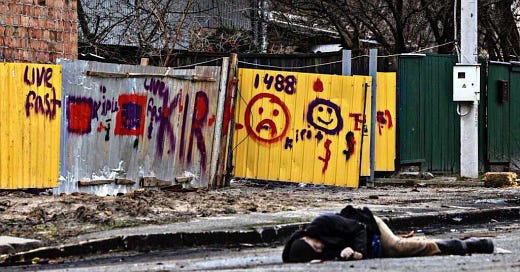
As the war in Ukraine stretches through its second month, Pope Francis continues to show a deep, personal, sometimes obviously emotional, solidarity with the suffering of the people in Ukraine while maintaining the Holy See’s traditional, official diplomatic neutrality.
The pope’s difficult task is balancing pastoral leadership and diplomatic engagement, while always insisting on the Church’s message for peace.
But those tasks have seemed at times to muddy the pope’s position on the very concept of war, and especially the notion of a “just war.”
With the Ukrainians facing a long and lonely fight to liberate their country, clarifying the justice of their cause — especially as the nature of the conflict shifts — may become necessary for the Holy See.
On a call last month with Moscow’s bellicose Patriarch Kirill, Francis told the head of the Russian Orthodox Church that “There was a time, even in our Churches, when people spoke of a holy war or a just war. Today we cannot speak in this manner. A Christian awareness of the importance of peace has developed.”
“Wars are always unjust,” the pope said; an unqualified statement which left many scratching their heads and wondering if Francis was actually suggesting, as he previously seemed to do in his encyclical Fratelli tutti, that the Church’s traditional understanding of a “just war” no longer applied in the modern age — even the Ukrainian people’s war of defense and self preservation.
While resisting violence is a matter of moral self-defense by the victims - and a necessary point of intervention for the international community - it seems that Francis would be reticent to frame that self-defense as “just war” — or at least, he has been thus far.
But might the international order be less developed than the pope had hoped? He now seems to think so.
During his general audience on Wednesday, Francis said that “in the current war in Ukraine, we are witnessing the impotence of the United Nations Organization.”
“After the Second World War an attempt was made to lay the foundations for a new history of peace, but unfortunately - we do not learn - the old history of competing great powers has continued,” said the pope.
His secretary of state, Cardinal Pietro Parolin, has also insisted that Ukraine’s armed resistance is “legitimate,” while noting that the desire to avoid escalating the conflict has prevented international bodies and other nations from intervening directly in the conflict.
As the international community debates how best to continue support for Ukraine’s self-defense, balancing the desire to feed aid and arms into the country while minimizing the risk of the war spilling over into a bigger fight between the Western nations and Russia, the question of what is “just” seems likely to loom every larger.
Many analysts have floated the possibility that, as Russian forces pull back from Kyiv and the surrounding area, revealing atrocities in their wake, they may attempt to shore up and consolidate their hold on eastern parts of the country.
If Russia offers a ceasefire in return for preserving those gains, how far will Rome perceive the “justice” of open-ended Ukrainian resistance extend?
Would the Vatican recognize the justice of ongoing armed resistance, with further loss of life, as the natural right of a people resisting the occupation of their country — especially in the light of war crimes against the civilian population?
At what point, if any, would Rome suggest the legitimacy of Ukrainian armed resistance against its violent aggressor should yield to the imperative to make peace?
Expecting the Church, the Vatican, or the pope to pronounce on these issues might seem like asking for an unacceptably explicit kind of moral endorsement for Ukrainian arms.
But given the centrality of religion to many aspects of this conflict — and Kirill’s doubling down in favor of the Russian government’s imperialistic rationale for the invasion — some kind of clarity could soon be needed, especially in the light of Francis’ previous statements on no war ever being just.
Of course, it is perfectly right for the pope to remind everyone, on all sides of the conflict, that war is always a bringer of death, and the taking of human life can only debase, never ennoble us.
But, as the war looks set to stretch into the distance, extended by the “impotence” of the international institutions to which many like Francis looked to prevent it, explaining the “justness” of Ukraine’s fight may itself become a matter of justice.







It's time (and then some) for the UN to be completely reworked into something that isn't a bureaucratic behemouth that it's become and built more on justice than ideology.
It is the essence of progressive nonsense. It sounds good, until you think about it. "No war can ever be just." is a horrible thing to say, but it sounds nice, because war is hell and there is a lot of truth in hating war. Saying no war can ever be just is saying that no warrior can ever be just. In one sweeping statement, he condemned millions of Catholic soldiers, airmen, sailors, and Marines as preparing to do something intrinsically unjust.
But since thinking about it proves the absurdity of the statement, he actually just lowered everyone's opinion of Church teaching. If "no war can ever be just" is a Church teaching, and adults can never believe such a sophmoric statement, then adults can safely ignore Church teaching. All nice stuff for the children, but we have to go to the firing range so Putin doesn't invade us next.